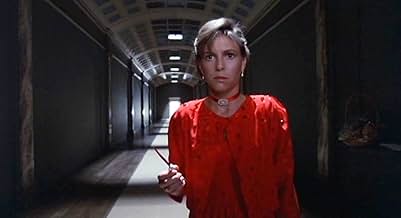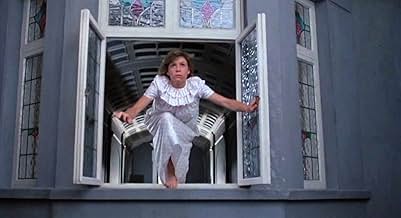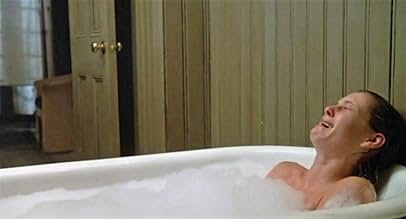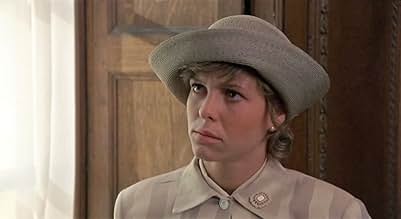She'd been ruled by her father all her life, and now, after she's been attacked in her apartment, struggling musician Kathy starts reliving the event in her dreams. She seeks help at a sleep... Read allShe'd been ruled by her father all her life, and now, after she's been attacked in her apartment, struggling musician Kathy starts reliving the event in her dreams. She seeks help at a sleep disorder research center, but in doing so she encounters some unexpected results.She'd been ruled by her father all her life, and now, after she's been attacked in her apartment, struggling musician Kathy starts reliving the event in her dreams. She seeks help at a sleep disorder research center, but in doing so she encounters some unexpected results.
- Awards
- 1 win total
- Director
- Writer
- All cast & crew
- Production, box office & more at IMDbPro
4.7692
1
2
3
4
5
6
7
8
9
10
Featured reviews
The Room of Slow Dreams
Well, all-in-all this is a rather lame & pretty disappointing movie. It's not badly made or hasn't any noticeable technical flaws for that matter. It's just that the pacing was too slow and on several occasions the suspense was really lacking. A lady gets attacked in her apartment by an unwelcome visitor (well not really her apartment, since she's still a little daddy's girl, but an apartment she sub-rents from some musician who is out of town). She manages to overcome him. However, she remains traumatized and starts developing some serious mental issues (like in: ripe for the loony-bin). I won't tell much more for those of you who still want to check out this movie, because, well, it is directed by Alan J. Pakula after all, so I'm sure you could do worse picking up a random movie (not that I'm a fan of this director or anything). It has maybe one or two tense scenes and some enjoyable dream-sequences. But that's all, basically. The final scenes in the building in London had something promising going on there, but in the end the conclusion is just disappointing. They really should at least have thrown maybe some incest and a lot of killings in there to spice things up (not that these are things that make a movie good, but hey, if you're out to terrify your audience, then why not make the extra effort?). But no, just pretty lame stuff and secretive dream-research in some basement room is all you will find in this one. So why didn't I flunk this movie? I dunno... maybe I'm just a nice guy. Or maybe it's a better movie than I first thought it was? If I'll ever re-watch it, I'll let you know.
Relentless creep-out from director of "Klute"
This is a creepy little film... Kristy McNichol plays Kathy, a flautist and daddy's girl from the suburbs who is invited to join a professional jazz combo with a gig in a downtown restaurant in a big city. No sooner has she rented an apartment in town than she is attacked by a stalker, whom she kills in self-defense. Afterwards she attempts to suppress the memory of the attack and subsequently is plagued by a recurring nightmare where she relives the night of the attack. The rest of the movie deals with her relationship with a sleep researcher who uses her as a guinea pig in his experiments into the dream-life of animals. The scenes with McNichol playing flute and scatting are a little embarrassing (the movie employed technical advisors for scenes involving clinical psychology, and they could have used similar advice in the scenes with the jazz combo). Also, there's not much dramatic tension in a movie where Science is the protagonist and the only real antagonist is McNichol's lingering nightmares (in contrast with, say, "Altered States", where sound scientific theories complemented perfectly the fact that all the scientists were raving nutters). But the atmosphere is certainly unnerving and claustrophobic. The movie shifts from dream-frame to reality-frame often enough so that at the most crucial moments, you're kept guessing whether what you're seeing is real or not. Director Pakula coaxes his usual understated, naturalistic performances from all concerned. McNichol is perfectly cast as the slightly lost, sexually vulnerable young artist out on her own for the first time, and gives a great performance I've never seen her match. Her scenes with her father are affecting and pathetic. Paul Shenar is great, too, as Kathy's Dad; "Twin Peaks" fans will no doubt spend most of the film watching and waiting for the man who played Laura Palmer's possessed father to look in a mirror and see the face of Bob. To sum up: this is not one of Pakula's best movies, but definitely worth seeing--if only for the scene where McNichol meets her psychotic, and armed, self in a dream.
Not good enough to be a dream, not bad enough to be a snore
The involvement of lead actress Kristy McNicohl, director Alan J. Pakula and cinematographer Sven Nykvist (best known for his regular work with Ingmar Bergman), as well as a fascinating premise, were four good reasons to see 'Dream Lover'.
Really hate to see one of the dissenting voices here but 'Dream Lover' didn't do it for me. Can see why it was panned by critics because to me there were some big problems, while not finding it anywhere as dreadful as reputed (certainly do not agree that 'Dream Lover' didn't have redeeming values). 'Dream Lover' was just a film that could have executed a good idea much better. It had all the makings of a thought-provoking and creepy film, but both of these only came in spurts rather than an overall whole.
'Dream Lover's' best asset is Nykvist's cinematography, frighteningly surreal and beautifully dreamy 'Dream Lover' looks striking in this regard. The sets and lighting are similarly atmospheric. Some sequences actually are pretty unsettling and have suspense and creepiness.
The cast are also a strength and do their best with the wanting material with professional. McNichol is in an atypically darker role to usual and gives plenty of intensity and vulnerability, it's a great lead performance in a challenging and different role for her. Plus she looks sensational. Paul Shenar, who if he made better career choices and hadn't died so young just three years later would have made it bigger, plays one of the creepiest domineering father figures personally seen in any film recently. His chemistry with McNichol has moments of pathos and chills.
Ben Masters is charming and Justin Deas makes the most of a role that isn't developed enough. There are a few thought-provoking moments.
On the other hand, the story and pacing spoil 'Dream Lover'. Some of the pace is leaden and like riding on the back of a lethargic snail. In terms of atmosphere, there is a lack of tension and suspense in general and too often is too sterile. The story is dull with parts that feel like overlong and irrelevant padding and not always easy to follow (downright confusing even in some places), while the ending is anti-climactic and preposterous.
Pakula's direction is uninspired at best and somnambulist at worst, don't think he was that interested in the film or knew what to do with it. While the production values are generally good some of the editing is amateurish, especially the shocking gaffes in day/night scenes.
Rest of the cast struggle to do anything with sketchily written plot device characters (true of the characters here in general) and weak dialogue. The script has thoughtful moments but generally is flabby and gets bogged down by too much confused and rambling psychobabble and overkill histrionics. The music score is forgettable and doesn't really gel with the atmosphere of the film.
On the whole, not that bad but to me it was far from a dream. 4/10 Bethany Cox
Really hate to see one of the dissenting voices here but 'Dream Lover' didn't do it for me. Can see why it was panned by critics because to me there were some big problems, while not finding it anywhere as dreadful as reputed (certainly do not agree that 'Dream Lover' didn't have redeeming values). 'Dream Lover' was just a film that could have executed a good idea much better. It had all the makings of a thought-provoking and creepy film, but both of these only came in spurts rather than an overall whole.
'Dream Lover's' best asset is Nykvist's cinematography, frighteningly surreal and beautifully dreamy 'Dream Lover' looks striking in this regard. The sets and lighting are similarly atmospheric. Some sequences actually are pretty unsettling and have suspense and creepiness.
The cast are also a strength and do their best with the wanting material with professional. McNichol is in an atypically darker role to usual and gives plenty of intensity and vulnerability, it's a great lead performance in a challenging and different role for her. Plus she looks sensational. Paul Shenar, who if he made better career choices and hadn't died so young just three years later would have made it bigger, plays one of the creepiest domineering father figures personally seen in any film recently. His chemistry with McNichol has moments of pathos and chills.
Ben Masters is charming and Justin Deas makes the most of a role that isn't developed enough. There are a few thought-provoking moments.
On the other hand, the story and pacing spoil 'Dream Lover'. Some of the pace is leaden and like riding on the back of a lethargic snail. In terms of atmosphere, there is a lack of tension and suspense in general and too often is too sterile. The story is dull with parts that feel like overlong and irrelevant padding and not always easy to follow (downright confusing even in some places), while the ending is anti-climactic and preposterous.
Pakula's direction is uninspired at best and somnambulist at worst, don't think he was that interested in the film or knew what to do with it. While the production values are generally good some of the editing is amateurish, especially the shocking gaffes in day/night scenes.
Rest of the cast struggle to do anything with sketchily written plot device characters (true of the characters here in general) and weak dialogue. The script has thoughtful moments but generally is flabby and gets bogged down by too much confused and rambling psychobabble and overkill histrionics. The music score is forgettable and doesn't really gel with the atmosphere of the film.
On the whole, not that bad but to me it was far from a dream. 4/10 Bethany Cox
"There are about 100 tortures in your living room"...the 101st must be the pacing of this movie.
In the opening and closing credits, the filmmakers acknowledge the services of sleep research centers and consultants in the making of this movie. But while there is some educational dialogue about dreams, the main concept - the heroine acting out her dreams - is not as innovative as they seem to think; haven't these people ever heard of the word "sleepwalking"? Kristy McNichol is fine (if one-note) in a demanding role, but director Pakula's pacing is off, the thrills are few, and the finale, with one character apparently transforming into Superman, is ludicrous. (*1/2)
I love the look of this underrated movie
Kristy McNicol is totally miscast and the ending, the one that takes place outside with the characters teetering on the edge of the skyscraper, was really bad and a groaner, but the rest of the film is pretty good. I'm not a big Pakula fan but I really like his minimalist approach to the somewhat contrived story. The look and feel of the film are my favorite part. The cinematography is excellent. McNicol's NY apartment is one of my favorites in any movie. It's so small and compact but cool. Wish I had it. The recurring dreams have a really unsettling quality to them. I'm impressed that Pakula actually went ahead and had these dream sequence be really become repetitive. I'm sure this turned off a huge portion of the audience but I thought they were really effective because they were so repetitive. The sound design during those nightmares sequences are also worth noting. The dream sequences of McNicol walking down a huge hallway were also amazing. I give the film's production design a huge 10. I wish I could give 10 to the rest of the film but can't. But even with all its faults, DREAM LOVER is a very overlooked movie.
Did you know
- TriviaDenise Stephenson's debut.
- How long is Dream Lover?Powered by Alexa
Details
Box office
- Gross US & Canada
- $502,237
- Opening weekend US & Canada
- $202,733
- Feb 23, 1986
- Gross worldwide
- $502,237
- Runtime
- 1h 44m(104 min)
- Color
- Sound mix
- Aspect ratio
- 1.85 : 1
Contribute to this page
Suggest an edit or add missing content



































